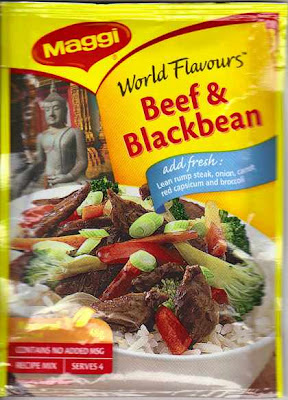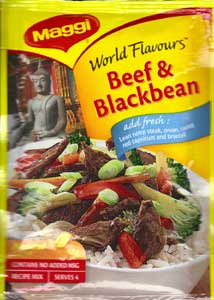බුදු රුව සහිත හරක් මස් පැකට් මැගී හරහා ඔබ වෙත එවන නෙස්ලේ....,

මැගී නූඩ්ල්ස්..., ලංකාවේ හැමෝම දන්නා නමක්..., ලොකු පොඩි හැමෝටම හොඳයි කියා විකුණන මැගී නිශ්පාදන වලට බුදු පිලිමයක් සහිත මේසයක රුවක්ද එක්කර ඇති බව ඔබ දන්නවාද..., ඒ එක්සත් රාජධානියේ හරක් මස් නිශ්පාදනයකටයි. එහි වැකිය ලෙස දමා ඇත්තේ, ''හරක් මස්, බුදුන්ගේ ප්රියතම ආහාරයයි..'' (Beef the favorite of Lord Buddha) ලෙසටයි.
මෙම රුව එක්කිරීමෙන් නෙස්ලේ ආයතනය බලාපොරොත්තු වූයේ කුමක්දැයි නොදන්නා මුත් මෙය බෞද්ධයන්ට කල බලවත් අසාධාරණයක් බව හා ගෞතම බුදුන්ට කල නිග්රහයක් බව පැහැදිලිය.
මෙය 2007 වසරේ දී නිකුත්වූවක් බව කරුණාවෙන් සලකන්න. මේවන විට එම රුව වෙනුවට චීන මහා ප්රාකාරයේ රුවක් එක් කර ඇත.

OH LORD ! FORGIVE THEM FOR WHAT THEY DO NOT KNOW
by Dr. Tilak S. Fernando reporting from London
 Time is ripe for the Buddhist communities throughout the world to pray deafeningly in ‘Christian fashion’ and say ‘Oh Lord forgive them for what they not know’ at a time when Western adverting firms are becoming bizarrely cheeky and pay no respect or any regard to Lord Buddha, one of the great philosophers and a religious leader venerated by millions of Buddhist devotees over two thousand five hundred and fifty years!
Time is ripe for the Buddhist communities throughout the world to pray deafeningly in ‘Christian fashion’ and say ‘Oh Lord forgive them for what they not know’ at a time when Western adverting firms are becoming bizarrely cheeky and pay no respect or any regard to Lord Buddha, one of the great philosophers and a religious leader venerated by millions of Buddhist devotees over two thousand five hundred and fifty years!
It was Victoria Street, an American company which gave this impropriety a jump-start in printing Buddha’s image on ladies bikini tops and bottoms. This created mayhem among anguished Buddhists who took immediate and remedial action. The company immediately withdrew millions of their stocks from their world outlets at a tremendous loss of income and made an open apology to Buddhists.
Few months later, a departmental store in England followed suit by selling Buddha candles which stirred the wrath of the Sri Lankan Buddhists living in England, particularly London. Their relentless campaign and complaints to the Sri Lanka High Commission in London, finally managed to register Sri Lanka’s protest, as a country with over two thousand years of Buddhist culture and background. Not many months later a supermarket started the game again in selling Buddha Candles which was yet again protested by the Sri Lankan Buddhists in London.
Now in a latest and most unexpected move, a giant firm Nestles are at it again, this time to promote their ‘Maggie’ products under the label “World flavour of Beef Rump Steak,” – with the image of Buddha printed on colourful sachets seated next to meat products.
What is the great commercial attraction in using an immensely revered religious leader’s image as a universal commercial logo? May be perhaps, due to sheer ignorance on the part of young advertisers who know nothing about Buddhism that they contemplate on such apathetic ideas. Could it be that they firmly believe it might have some spiritual effect to woo customers to boost their sales ? Or is it simply down to blatant vulgarity with ulterior motives?
Most countries have blasphemy laws. The United Kingdom has an old, mostly disused blasphemy law which is rarely evoked. In Western countries, blasphemy laws largely protect Christianity but are unused and considered non-democratic and obsolete. Many mostly Muslim countries protect Islam in a much stricter way. Pakistan (1986) and Saudi Arabia are examples of countries with very strict blasphemy laws. In Pakistan the law is used to prevent any criticism of Mohammed, including literary and historical criticism.
The last person in Britain to be sent to prison for blasphemy was John William Gott on 9 December 1921. He had three previous convictions for blasphemy when he was prosecuted for publishing two pamphlets entitled Rib Ticklers.
Challenges to the blasphemy law in England have been made by members of parliament, human rights groups, religious representatives from many non-Church of England faiths, secularists and pressure groups. The biggest set-back is that the law is used so rarely that hardly anyone cares that it is still there. Some observers say there are two possible options to fix the blasphemy laws.
(1) Make the blasphemy laws apply to all religions
(2) Abolish the blasphemy laws
The problem with the first method they is: “ There are hundreds of religions with all kinds of absurd, irrational and heartfelt issues that would be deemed "blasphemous" and if it was possible to enforce it would lead to massive & impractical restrictions on everyone”
In Buddhism blasphemy laws are non existent. In such a situation what options do Buddhists have to stop such crudity adopted by present day commercial advertisers who seem to pay no heed to religion or the feelings of millions of Buddhist devotees?


Comments
Post a Comment
ඔබගේ අදහස්, යෝජනා, චෝදනා මෙතැනට දාන්න.